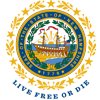What We Do
Connecting You to Life Outdoors
The Office of the Director supports the Commission, oversees the Department operation and through the Director's staff, maintains the Department's legislative, budget, human resources, federal aid, environmental review and landowner relations programs.
The Inland Fisheries Division manages all freshwater fish in state and interstate waters. Fisheries biologists and fish culturists work to provide New Hampshire anglers with prime fishing opportunities, and to protect and restore statewide aquatic habitat in the best interest of the public. This division is responsible for operating the Department's six fish hatcheries, which annually produce about 250 tons of salmonids.
The Law Enforcement Division enforcement all laws, rules and regulations pertaining to fish and wildlife. They also, by law, have responsibility for search and rescue operations and for enforcement of off-highway recreational vehicle regulations.
The Marine Fisheries Division manages saltwater species, including fish, lobsters, clams and oysters. Its concerns reach beyond the New Hampshire boundary, and staff work closely with other states and agencies to protect and maintain marine resources for both commercial and sport fisheries.
The Public Affairs Division provides information and educational resources that support and promote the mission of New Hampshire Fish and Game. Staff members coordinate print and digital communications, media relations, marketing, outreach, and educational programs such as hunter education, Let's Go Fishing, and aquatic resources education. The division also produces publications such as the New Hampshire Wildlife Journal and manages the Department’s web presence. Their work showcases the accomplishments of Fish and Game staff, officers, and biologists while educating the public about New Hampshire's rich wildlife resources and unique outdoor recreational opportunities available throughout the state.
The Business Division issues fishing and hunting licenses and associated permits, and collects the revenue from the sale of these licenses and permits. Division staff supervise the purchase of all equipment, materials, supplies and services; maintain the physical plant of the Fish and Game Department headquarters in Concord, as well as six hatcheries, three education centers and four regional offices; and manage and maintain the Department's vehicles and equipment.
The Wildlife Division manages and maintains the state's game and nongame species at levels consistent with available habitat, and promotes the security of that habitat. Wildlife biologists conduct surveys to monitor populations and oversee applied research that provides them with essential information. The protection, restoration and active management of wildlife habitat of public lands throughout the state is accomplished through the division's staff, who also provide technical assistance to private landowners. Those services also include assistance in preventing or reducing wildlife damage to orchards, agricultural lands and other private property.
The Facilities and Lands Division manages the planning, design and construction of public works projects, such as boat ramps and access sites throughout the state. This division is also responsible for the coordination of land conservation projects, including purchase and sale, easements, land use agreements and/or special use permits.



